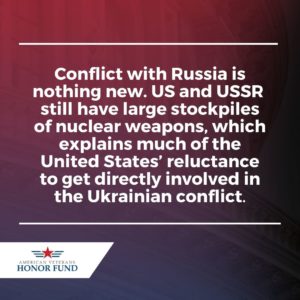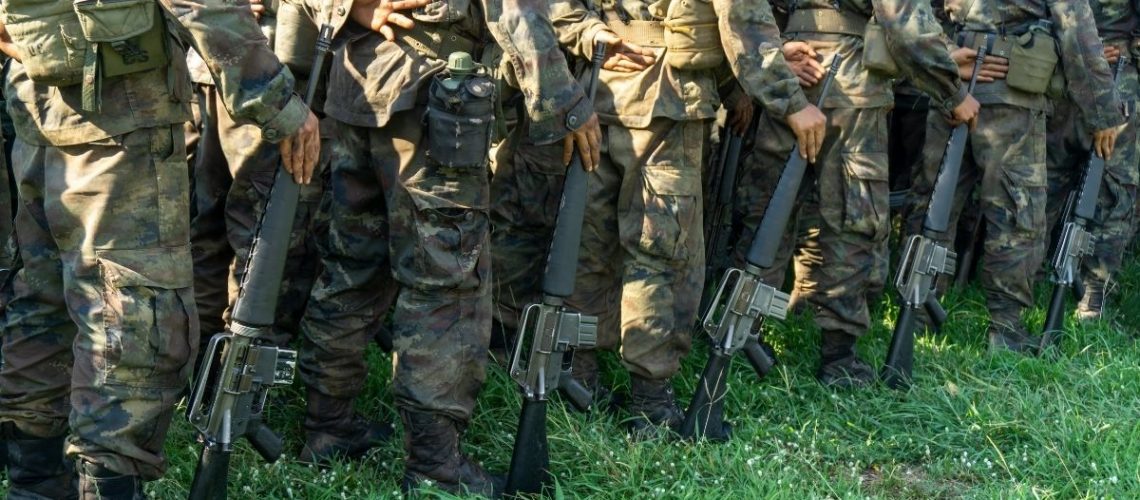Countries absorbing other countries through war was an aspect of geopolitics that many people thought the world had moved past. But on February 24, Russian troops moved into Ukraine. The size of the invading force, as well as the fact that the troops moved into multiple regions of the country simultaneously, revealed the scope of their mission: They wanted to take control of all of Ukraine.
The Conflict
The Ukrainian people courageously defended their sovereignty. In response, Russia turned to brutal tactics – relentlessly shelling cities, bombing civilian areas, executing civilians – to break the will of the Ukrainian people. This was a shocking change in the tenor of the war. “I honestly do not understand Putin’s position, it’s totally uncalled for, it has to be paranoia or insanity,” said Vietnam War veteran Bob Perry, a former Butler County Vet Board member, “He’s not been provoked in any way that I can see, and the fact that he’s shelling civilians is just off the wall. I just do not understand his purpose.”
The world has been trying to deduce Putin’s purpose. In a speech he gave three days before the invasion, Putin laid out his views on Ukraine: The country’s attempts to move away from Russia and integrate with the West, specifically its desire to join NATO, are the result of “a disease of nationalism,” which have caused Ukrainians to misunderstand that they are part of Russia and always have been.
The North American Treaty Organization (NATO) is a mutual defense pact: An attack on one of its members is an attack on them all. After the collapse of the USSR, three former Soviet republics, Estonia, Latvia, and Lithuania, became members. President George W. Bush said that NATO was open to working toward admitting the former republics of Georgia and Ukraine as well.
U.S. Rep. Warren Davidson, who represents Butler County and who was stationed in Germany with the Army when the Berlin Wall fell, said that he thought that NATO did not expand quickly enough: “Frankly I feel like [the conflict] could have been prevented with a more aggressive posture from NATO, particularly Germany and from the United States.”
Conflict with Russia is nothing new. For decades, the US and the USSR were locked in the Cold War, because a hot war, in which the two sides engaged directly, risked a nuclear war. Both countries still have large stockpiles of nuclear weapons, which explains much of the United States’ reluctance to get directly involved in the conflict, explained Butler County Vet Board President and Army vet Bruce Jones, ”just the threat of the nuclear thing – it’s the end of everything. If [Putin] thinks he can shoot one and somebody else wouldn’t, that’s exactly how something like that would start.”

The Tactic
The US has opted for different tactics. We’ve sent military aid to Ukraine, and our European allies have followed suit. We’ve also led the way in enacting massive sanctions on Russia and the country’s elites, despite initial reluctance from our allies in Europe, who depend much more on Russia oil and natural gas.
Vets are optimistic about the Ukrainian resistance. “They do not have military power to defeat Russia in short order but they have far more military power than the Taliban has and so I think in a long, slow insurgency I think they may in fact prevail,” said Davidson, the Army vet who was stationed in Germany, “They are showing a very determined resistance right now. I think it’s very important for NATO countries in particular to make sure Vladimir Putin stays contained inside Ukraine and eventually is driven out, because this is something that could spread.” Especially worrying is the prospect that Russia could invade a NATO member formerly under its control, like the Baltic states, Poland, or Hungary.
The prospect of war escalating and necessitating the deployment of US troops has put vets and their families on alert. Butler County Veteran Services Commission Executive Director Mike Farmer described the air of uncertainty that surrounds the conflict: “Some people have served overseas and they may have served in Europe and they’re kind of thinking now how does this happen? Russia is doing this with all these years of treaties and pacts. But as a community I think there is large uncertainty and everybody is kind of on pins and needles of what could happen.”
It appears that Russian troops are shifting the focus of their mission to expanding and consolidating the territory in eastern and southern Ukraine that Russia annexed in 2014. Peace negotiations appear also to be progressing. There is cause for optimism, but no one can predict what comes next. Few predicted that Russia would try to take over all of Ukraine.


